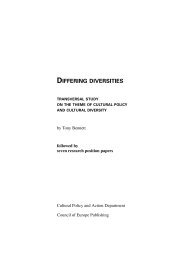Why we need European cultural policies: the impact of EU ...
Why we need European cultural policies: the impact of EU ...
Why we need European cultural policies: the impact of EU ...
Create successful ePaper yourself
Turn your PDF publications into a flip-book with our unique Google optimized e-Paper software.
One <strong>of</strong> <strong>the</strong> recommendations in <strong>the</strong> Feasibility study concerning <strong>the</strong> creation <strong>of</strong> a <strong>European</strong>observatory <strong>of</strong> <strong>cultural</strong> co-operation 84 was that additional impetus should be given todeveloping and collecting <strong>cultural</strong> statistics. The findings <strong>of</strong> my study have confirmed <strong>the</strong> <strong>need</strong> forextra effort in <strong>cultural</strong> statistics, to facilitate an improved understanding <strong>of</strong> <strong>the</strong> <strong>cultural</strong> sector ingeneral and <strong>cultural</strong> cooperation in particular; it will be costly both in terms <strong>of</strong> time and resources.As culture is not part <strong>of</strong> <strong>the</strong> acquis communautaire, it is difficult to find resources and, as it is nota clear responsibility, <strong>the</strong>re always seem to be o<strong>the</strong>r priorities.It is clear that <strong>the</strong> work <strong>of</strong> <strong>the</strong> Council <strong>of</strong> Europe and <strong>the</strong> <strong>European</strong> Audio-visual Observatory,as <strong>we</strong>ll as UNESCO, have had much more <strong>impact</strong> on <strong>the</strong> improvement <strong>of</strong> statistics in transitioncountries than has Eurostat. The lack <strong>of</strong> formulated shared policy on culture, has meant that<strong>the</strong>re is no legal obligation to monitor quantitative data at a <strong>European</strong> level. There is in turn nopressure from <strong>the</strong> <strong>European</strong> statistical authorities for harmonization (as is <strong>the</strong>re is in some o<strong>the</strong>rpolicy areas).O<strong>the</strong>r issuesSeveral o<strong>the</strong>r issues <strong>of</strong> direct relevance for culture <strong>we</strong>re not included in <strong>the</strong> questionnaire;<strong>the</strong> two particularly important ones being community funding programmes and intellectualproperty rights (IPR).85Community funding programmes, such as Culture 2000, for instance, have been <strong>the</strong> most visibleevidence <strong>of</strong> accession being linked to <strong>cultural</strong> <strong>policies</strong>. This explains why <strong>the</strong>re has been andcontinues to be so much interest in <strong>the</strong>m and so many studies assessing <strong>the</strong>ir <strong>impact</strong> on culture.Ho<strong>we</strong>ver, as noted earlier, <strong>the</strong> scope <strong>of</strong> this study did not permit us to analyze <strong>the</strong>se in detail, and<strong>the</strong> whole issue <strong>of</strong> funding has been tackled only marginally.86The <strong>impact</strong> <strong>of</strong> different funding schemes on <strong>cultural</strong> <strong>policies</strong> in countries in transition has beenrelatively easy to assess. It has mainly been in <strong>the</strong> form <strong>of</strong> grants and o<strong>the</strong>r financial incentives forculture and arts. Ho<strong>we</strong>ver, it also included changes in financing mechanisms in <strong>the</strong> new memberstates, transfer <strong>of</strong> knowledge and `best practices’, as <strong>we</strong>ll as enhancing cooperation which hasresulted in new partnerships and cross-border projects.While Community funding programmes have remained <strong>the</strong> most visible aspect <strong>of</strong> <strong>the</strong> <strong>European</strong>Union’s involvement in <strong>the</strong> field <strong>of</strong> culture, <strong>the</strong>ir importance and potential have <strong>of</strong>ten beenoverestimated. Before <strong>the</strong> start <strong>of</strong> negotiations and in <strong>the</strong> first phase <strong>of</strong> <strong>the</strong> accession to <strong>the</strong> <strong>EU</strong>,58Part 2 The <strong>impact</strong> <strong>of</strong> <strong>EU</strong> enlargement: results <strong>of</strong> <strong>the</strong> survey <strong>of</strong> researchers and policy-makers














